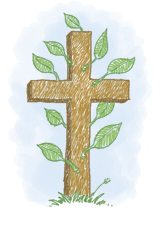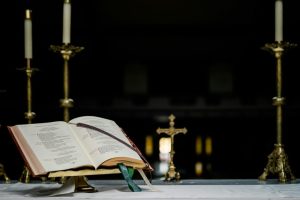We should honor God the Father by caring for our Mother Earth.
A recent dispute among Christians brought the gospel to the front page once again in August. At issue, according to the Associated Press, was the International Bible Society-Send the Light's plan to have the New Testament delivered with the Sunday paper in 11 metro areas, along with detergent samples and the latest zillion-blade razor.
Cries of Christian protest greeted the plan, with the main objection being that most of the copies of Holy Writ, including the first 200,000 planned for Fort Worth, Texas, would suffer the indignity of the wastebasket. Respect for God's printed Word aside, few seemed concerned that this evangelical strategy would leave further tons of paper and gallons of ink and other chemicals to gum up the environment.
We Catholics can be pleased that Pope Benedict XVI, on his summer vacation in the mountains of northern Italy, devoted a few words to the environment, urging Catholics to listen to the "voice of the Earth," according to the Catholic News Agency: "We cannot simply do what we want with this Earth of ours, with what has been entrusted to us." The greening of papal statements was quickly followed by the Vatican becoming the first sovereign state to go carbon neutral by planting trees in a Hungarian national park to offset its emissions. A papal encyclical on the environment is surely all we need now to make our green religious revolution complete.
Or is it? After all, with 1.1 billion of the world's population and about 70 million of us here in the United States, Catholics could make a significant dent in humanity's carbon footprint. Yet there is little reason to believe that Catholics exert any more effort than the rest of the citizenry at becoming creation-friendly. This despite the fact that our first duty according to the Bible is to till and keep God's garden (Gen. 2:15).
Coming up with a group response to the degradation of our earthly home is no easy task. But short of mandating recycling, carpooling, and compact fluorescent light bulbs for every Catholic, we might well begin with our common parish homes. Many of our buildings, beautiful as they may be, are the consumption equivalents of the Hummer H3. If, like the pope, we are to reduce or offset our consumption, we have a lot of work to do, from new heating and cooling systems for old buildings to "green" building practices for new parish construction. We may even need to abandon some buildings that can simply no longer be justified because of their environmental (and financial) cost. Cleaning up our environmental house won't be cheap.
There is some low-hanging fruit, however. How many of our parishes have daily or even Sunday Masses where the assembly could easily fit in a smaller space, allowing the main sanctuary to be fully heated and cooled only when necessary? And what about the paper we generate every Sunday? Parishes order boxes and boxes of subscription-based "missalettes," but few get recycled. And with people using the Internet more and more, the need for a printed bulletin for everyone who walks through the church door is surely unnecessary. Paper and can drives, once a parish funding strategy, might well return for evangelical purposes. Why shouldn't every Catholic parish be a recycling center?
Institutional changes are one thing, personal conversion quite another. The environmental catastrophe that scientists agree awaits us won't be averted unless people of faith see conservation as a truly religious duty. We Catholics are blessed in October with the feast of Francis of Assisi, whose Canticle of the Sun announces not only love for the natural world but dependence on it as well: "Be praised, my Lord, through Brothers Wind and Air, and clouds and storms, and all the weather…. Be praised, My Lord, through Sister Water; she is very useful, and humble, and precious, and pure…. Be praised, my Lord, through our sister Mother Earth, who feeds us and rules us, and produces various fruits with colored flowers and herbs."
One doesn't have to wonder what the man who thanked God for the weather would say about climate change, or how he might lament the pollution of precious Sister Water. St. Francis is called the patron of ecology for good reason, and he would no doubt weep over the slow murder of the Earth as he would mourn for his human sisters and brothers. Perhaps he will be our companion on the hard road ahead.
This article appeared in the October 2007 issue of U.S. Catholic (Vol. 72, No. 10, page 8).














Add comment